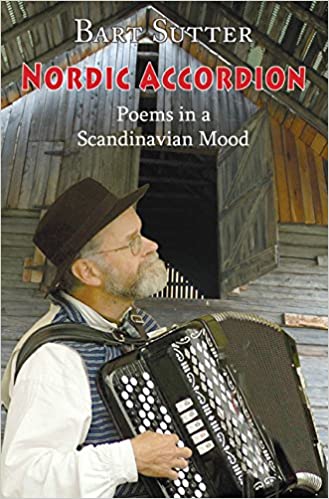| <- Back to main page |
(Nodin Press)
A poem in Bart Sutter’s new Nordic-themed poetry collection is entitled “I Come from Quiet People”—but this is not a quiet collection. Rollicking and song-like, Sutter’s poems gossip, retell, wonder, sympathize, dance, and generally hold forth about all things Scandinavian. There are even a few jokes to be found, though not of the Sven and Ole kind. The title poem talks about a Chicago musician who left his accordion in the back seat of the car to go in a restaurant,

And coming out, sure enough,
Found his window smashed,
But nobody had snatched
His accordion, but worse:
There on the seat, beside
His instrument, there sat
A second accordion!
I was pleasantly surprised to discover rhyme and meter poems in Nordic Accordion. Rhyme and meter can make even the most decorated and distinguished poet look like a fool, but Sutter, who has served as the Poet Laureate of Duluth, seems to have the good humor and bravado of a high wire artist. The results are mixed. “Funeral Rites”, for instance, a poem about a romantic encounter at a funeral, made me wonder if perhaps a sixth-grader and Bart Sutter had accidentally gotten their poetry switched:
They walked out to the parking lot.
He asked if he might call
Some day to take her out for pie.
She wasn’t shy at all.
Still, there’s a folksy charm about these ballads that remind me of sidewalk chalk art. And some of the poems are something more—they capture the beautiful simplicity of lyric poetry. From “Helga Tells the Homecoming”:
When we came off the mountain,
Oh, we were something then!
They all ran out to greet us—
Children, women, men
The last poem is from a section about the herdswomen of Sweden, who would take their cows to summer pastures in the mountains and live with them there. Sutter learned of the songs and traditions of these cow girls on visits to Sweden, and many of the poems are in the voice of the women themselves—Helga, Solvig, Lisa—now old women:
Well, here I sit in this big chair,
And everything’s a blur,
Though I was pretty, long ago,
And could I blow the lur!
These poems recall the verse of Selma Lagerlöf or Bjørnstjerne Bjørnson—a naturalistic romanticism not far removed from the medieval troubadours and Minnesängers.
Elsewhere in the collection, Sutter covers immigration to Minnesota, his own trips to the Nordic countries, growing up Scandinavian, and a few miscellaneous pieces like “A Taste for Ptarmigan”:
On December first, it snowed a foot.
On the second, it snowed two more. Then
It quit and turned off cold, so
Cars refused to start and people just sat still.
Ah, northern Minnesota.
Perhaps the most personal poem in the collection is ostensibly not about Sutter at all, but a Finnish poet who died tragically young. “Forgive Me, Edith Södergran” (first published in Whistling Shade’s Spring/Summer 2018 issue) begins with a lament:
Oh, Edith Södergran, I’ve had it hard.
I did not get the place I wanted, felt that I deserved,
And so I worked at pointless jobs for years.
But by its end the poem has turned into a sort of hymn to the triumph of the spirit:
You said your soul was a light blue dress
The color of the sky. I see you on the shore
Of Lake Superior, late in spring, when heaps
Of light-blue ice lie shattered on the rocks
And clouds of steam lift off the water.
I see you there, but then you’re gone.
I’ve stopped complaining, Edith Södergran
It’s that resigned Scandinavian stoicism we all adore here in Minnesota, and even the brighter pieces of Nordic Accordion reveal it here and there:
I have been a cheerful person,
But life will bring raw sorrow for anyone
Of woman born, and we must bear it as best we can.
(“Mina Anderson Contradicts the Author Vilhel Moberg”)
And indeed, this is a cheerful book, filled with food and livestock and taverns and self-deprecating humor, and one I would warmly recommend. It is a world removed from the private, confessional poems we read so much of these days. Bart Sutter is certainly a showman, but he puts on a good show, waving things about, making things disappear, forgetting and remembering again:
Here is the breadknife my sister struck in the landlord’s guts
A Bible, a candle, and a birchbark bowl
In the low-slung hut made of sod and sticks
Where I lived six hundred years ago.
(“An Evening of Swedish Folk Songs”)
- Joel Van Valin